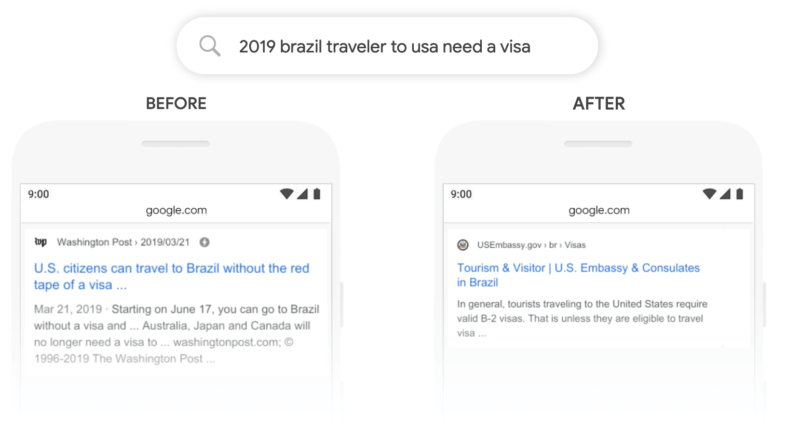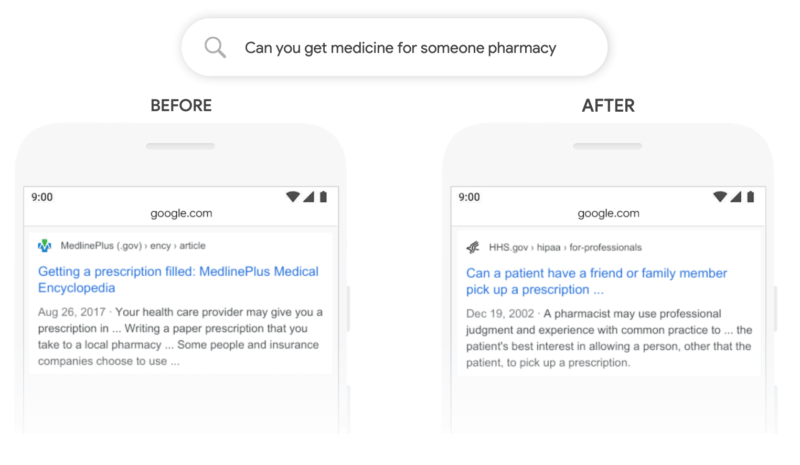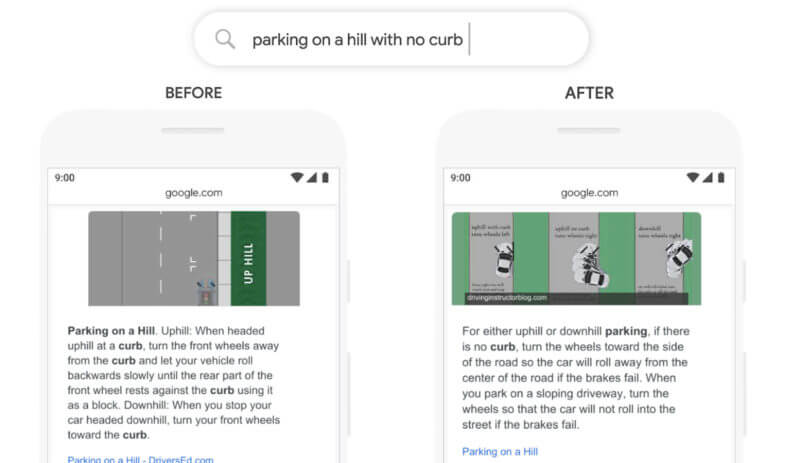Google BERT update and SEO. Google released what may be the biggest change to its search results in years, the Google BERT update.
Here’s what we know so far and BERT.
What We’ll Cover Around BERT Update:
- What Google’s BERT is
- How BERT affects RankBrain and natural language processing
- Examples of BERT search results
- How BERT affects SEO
- What BERT means for marketers
Meet Google BERT Update, It Is New.
BERT, short for Bidirectional Encoder Representations from Transformers, is Google’s latest update to its search system, and search experts are calling it the biggest update to the system since RankBrain launched five years ago.
Google began rolling out BERT this week, and though average searchers may not notice the change, Google reports that it will likely affect 1 in 10 searches.
So, what is the BERT Algorithm Update?
In layman’s terms, BERT is a system that helps Google better understand what people are looking for when they search.
It’s an update to Google’s natural language processing, which is used to match a search query with the content on a page.
Essentially, it’s the next step forward in Google’s quest to better understand natural language in context, and match search results as closely as possible to a searcher’s intent. And it’s just one of the many signals Google uses to understand and match search queries to results.
For example, as Search Engine Journal notes, Google can pick up on in synonyms used in search queries, and match them to the actual word on a page. It can also pick up on misspellings. Now, it’s adding BERT on top of that to better interpret a query.
That said, BERT won’t necessarily come into play for all search queries. Rather, it will be used on a query-by-query basis, and depending on the query one or all of the methods above could be used.
BERT will affect organic search results as well as featured snippets.
BERT, RankBrain, and Natural Language Processing
RankBrain, Google’s first AI for search queries, isn’t going anywhere. Rather, BERT builds on the work that RankBrain’s been doing.
Introduced five years ago, RankBrain is a machine-learning artificial intelligence algorithm that the Google search engine uses to process search results.
The adoption of AI like RankBrain represent a shift in Google’s approach to its search results; rather than focusing primarily on keywords, it is instead relying on natural language processing to help it better understand the context behind the keywords.
In doing so, it can more accurately pair a search for “how to dress up blue jeans” with an article containing tips and tricks for wearing jeans to fanicer occasions, rather than an ecommerce store selling blue jeans, for example.
Naturally, the system has evolved over the years. That’s where BERT comes in.
Like RankBrain, BERT is a technology aimed at helping Google better understand intent and meaning behind search queries. Think of it as the next step in the evolution.
Because it’s a separate system, either BERT or RankBrain could applied when processing a search request, depending on the complexity.
When Will Google Use BERT? Examples of Google BERT Update in Action
According to Google, BERT is intended to help it better understand the nuances and context of the words used in searches, and in turn, match those queries with the most relevant results.
To illustrate, Google has provided a few examples.
First up, Google presented a search for “2019 brazil traveler to usa need a visa.” At first glance, it appears to be an average search. But Google points out that the use of “to” here is incredibly important.
Pre-BERT, Google would likely return results focused on US travelers going to Brazil. But with BERT, it can pick on how a small word like “to” can change the intent of the search.

Google BERT in a search result. Image courtesy of Search Engine Journal
Similarly, in a query for “Can you get medicine for someone pharmacy” would have previously returned a result simply for instructions on getting a prescription.
But thanks to BERT, the result now more closely matches the intent of the search by picking up on the fact that the searcher is actually looking for information on retrieving a prescription for another person.

Google BERT example. Image courtesy of Search Engine Journal
Google has also given an example of BERT used in a featured snippet result.
The example it used was for the query “Parking on a hill with no curb.” Google noted that before, it would have emphasized the word “curb,” and not the word “no,” resulting in a skewed result. Now, the featured snippet is much more relevant to the search at hand.
How Does Google BERT Algorithm Affect SEO?
It’s important to understand that BERT analyzes search queries, not the content on a page.
So, while there’s not much you can do to optimize for BERT directly, it does means you should double-down on your efforts to create relevant, quality content.
As Google gets better at understanding natural language and eliciting the actual meaning and context behind its many search queries, it will also get better at finding the pages that best fit those queries.
That means that poorly-written, thin content likely won’t fit the bill.
Instead, focus on creating content geared towards the actual questions your audience is asking.
Marketers can also gain a leg up by incorporating dedicated FAQ sections, focused not just on keyword density but quality answers.
As far as featured snippets, marking up pages with FAQ, How-to, and Q&A schema is recommended for increasing your page’s likelihood of being picked up by BERT.
Also of note, keep in mind that because featured snippets are picked up quite often in voice search results, the introduction of BERT will likely have a big effect on voice search as well.
So, What Does The Google BERTo Update Mean For You?
Simply put, BERT is a big deal.
Google itself is calling BERT “the biggest leap forward in the past five years, and one of the biggest leaps forward in the history of Search.”
While the intention of BERT is to benefit searchers, it seems inevitable that it will have an effect on how sites are ranked in the results.
Your best bet is to closely monitor your rankings over the next few weeks. If you notice any drops, be sure to evaluate the content on-page and make sure it closely matches searcher intent.
Did the Google BERT update impact you? Comment below.
